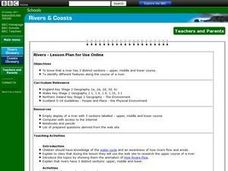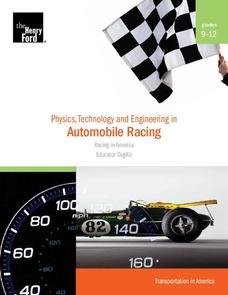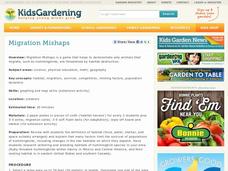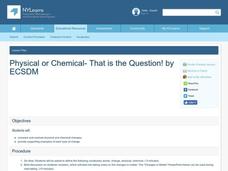BBC
Rivers - Lesson Plan for Use Online
Here is a very nice activity on rivers and the water cycle designed for young learners. In it, pupils view two animated cartoons that do a terrific job of showing how the water cycle works, and how rivers flow. After that, everyone...
Henry Ford Museum
Physics, Technology and Engineering in Automobile Racing
Start your engines! This five-lesson unit introduces physics and Newton's laws through automobile racing. Each lesson includes background information, a student worksheet, and an answer key. There are also culminating project...
NASA
Photons in the Radiative Zone: Which Way Is Out? An A-Maz-ing Model
Can you move like a photon? Young scholars use a maze to reproduce the straight line motion of a photon. The second in a six-part series of lessons on the sun has learners measure angle of incidence and refraction to determine the path...
NOAA
A Watery World
With about 70% of the earth's surface covered in oceans, it's fair to say that we live in a very wet world. Young scientists gain a better appreciation of this fact as they use maps to identify the world's ocean basins in the first...
DiscoverE
Slinky® Science
Toys are great for learning about physics. Scholars use Slinky® toys to study Newton's laws of motion and types of energy. After a little play, they then model longitudinal and transverse waves with the Slinky® toys.
National Gardening Association
Migration Mishaps
Elementary ecologists pretend to be migratory hummingbirds. They fly between wintering and nesting grounds, trying to reach a habitat haven. In a musical-chair fashion, some birds will miss out, and are removed from the game. To further...
University of Colorado
Is There Life on Earth?
To find life on another planet, scientists look for gases (atmosphere), water, and temperatures that are not extreme. In this activity, groups of pupils become "Titan-ians," scientists who want to explore Earth for possible life forms....
Prince William Network
Migration Headache
During this game, kids become migratory shorebirds and fly among wintering, nesting, and stopover habitats. If they do not arrive at a suitable habitat on time, they do not survive. Catastrophic events are periodically introduced that...
Space Awareness
Oceans on the Rise
Temperature rises and land disappears! Through a lab exploration, learners understand the effect of temperature increase on water similar to the effect of global warming on our oceans. As they heat the water in a flask, they measure the...
NASA
Christa's Lost Lesson: Effervescence
How are chemical reactions affected by gravity? Learners explore the phenomenon of effervescence as part of the Christa's Lost Lessons series. They compare findings in an experiment on effervescence to a video of a similar experiment in...
Curated OER
Amusement Park Physics
Students conduct a series of experiments on conservation of energy and momentum. In this physics lesson, students investigate the factors affecting the period of the pendulum. They build a roller coaster and calculate the marble's...
Purdue University
Healthy Body Image: A Lesson Plan for Middle School Students
This is a very valuable lesson for middle schoolers on the importance of maintaining a healthy body image through diet, exercise, and positive mentality. The resource includes four lesson plans. The first two plans outline the physical...
Curated OER
Solar Kit Lesson # 12 - Calibration Curve for a Radiation Meter
Scientists need to have mastered algebraic slope-intercept concepts in order for this lesson to be effective. They will measure and graph solar panel output as a function of the amount of radiation striking it, discovering that there is...
Curated OER
Playing With Science
Young scientists investigate the scientific concepts and principles that help make common toys such as hula hoops, yo-yos, slinkies, and silly putty work. As a class, they read "Backyard Rocket Science, Served Wet" to get a look behind...
Science 4 Inquiry
Trick or Science: Catching the Light
Your class might be surprised to learn that mirrors have been around since the first century AD! Young scientists explore reflection and refraction of light through a series of challenges. They use this knowledge to design their own...
Colorado Unit Writing Project
Simple Machines
Planning an elementary science unit has never been simpler! These twelve lessons guide young scientists through an exploration of simple machines and their many uses in the real world before asking them to apply their learning in the...
American Chemical Society
Curious Crystals
Crystals are more than meets the eye! Can learners tell them apart simply by observation? As they examine five samples with a magnifier, they find that appearance alone is not enough. This serves as an introduction to a mini unit on...
Curated OER
To Float or Not to Float - A Lesson on Density
Students observe and experiment with the concept of density. This is done using a simple experiment that helps them to apply scientific principles of observation and proving a hypothesis.
Cornell Lab of Ornithology
Amazing Birds
What's so amazing about birds? Find out just how amazing birds are with a physics of animal behavior unit created by Cornell Lab of Ornithology. Have learners explore and tap into their observational skills and notice how birds fly, what...
Teach Engineering
Understanding Elements
Nothing says organization quite like a table. The third lesson in a six-part Mixtures and Solutions unit teaches young scientists about elements and the periodic table. They learn how the periodic table is organized and about the...
National Nanotechnology Infrastructure Network
Is Measuring an Art or a Science?
Not only do future engineers learn the difference between accuracy and precision, they also get some hands-on experience using different measuring tools.
Newspaper Association of America
Cereal Bowl Science and Other Investigations with the Newspaper
What do cereal, fog, and space shuttles have to do with newspapers? A collection of science investigations encourage critical thinking using connections to the various parts of the newspaper. Activities range from building origami seed...
Curated OER
Physical or Chemical- That is the Question!
Learners observe the differences between physical and chemical changes in properties. Through the use of an interactive presentation, the students compare and contrast the changes and provide supporting examples of each type of change.
American Chemical Society
Investigating the Line
Note that this lesson is best paired with the preceding lesson in the unit. In that lesson, elementary physical scientists observed that the color coating of M&Ms® candies do not mix when dissolved off of the chocolate surface. Now...

























